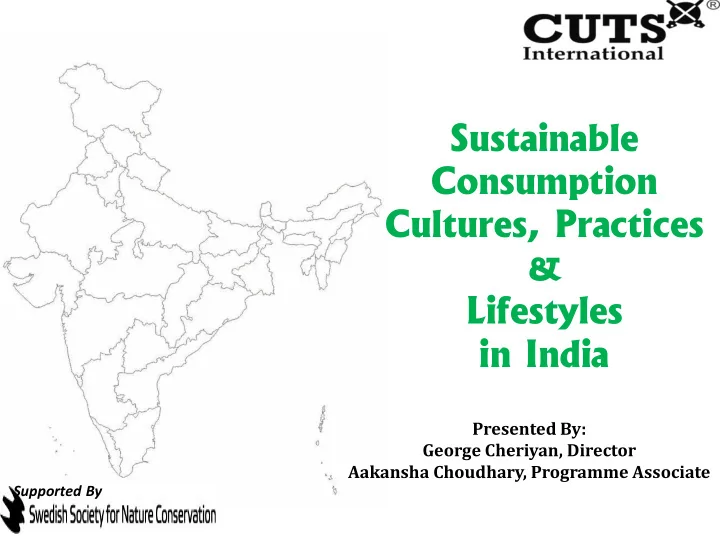

Sustainable Consumption Cultures, Practices & Lifestyles in India Presented By: George Cheriyan, Director Aakansha Choudhary, Programme Associate Supported By
About the Project Objectives 1. To retain and regain the traditional and cultural practices in relation to Sustainable consumption cultures practiced in India, since ages and establish a clear context of their use in urban modern day settings. 2. To put these practices on a global platform for wider outreach and dissemination to suggests ways and ideas to the World to turn to a Sustainable Lifestyle.
Scope of Project 1. Traditional practices and its potential being developed and integrated in a modern day society contributing towards enhancing Gender Equality, community development, democratic rights etc . 2. Successful Business cases based on traditional and indigenous knowledge to leverage people out of poverty. 3. Air Cooling- How traditional practice of using conventional air coolers could be developed for use in Urban India.
CASE STUDIES
Sustainable Habitats “ Are we actually becoming ‘good at cities’ in a way we weren’t hundreds of years ago?” -Ben Hammersley Bamboo House in Agartala, Tripura Deeg Palace/Jal Mahal,Bharatpur, Rajasthan Bada Imambara, Lucknow, UP Mud and Bamboo Hut, Guwahati, Assam
1. Sustainable MUD Marvels • Inspired by Spiritual values of Buddhism. • Adobe construction-Use of Mud Bricks(80:20) • Recycled wood from old buildings • Energy efficient and low-cost buildings • Done more than 150,000 buildings and half a million mass dwelling units, all using sustainable technologies. Built: 1996 • Cost: INR 400,000 • Cob technique • Build entirely with clay rich mud that • was procured locally and then stabilised with 5 percent cement content. Buildings as ‘Raw material depots' • Zero maintenance cost. •
2. Alternatives to AC-Air Coolers to Hybrid Chillers 1. 1772 Manually Operated Air- cooler in Deeg Palace. 2. Iron Air- Coolers from Jodhpur 3. Wooden Air Coolers from Up cycled Pine wood in Bhilwara.
Vaayu Hybrid Chillers AC Vaayu Machine 6 Ton Vaayu MIG 24 Power Input 6,000W 800W Power Consumption 18,00,000W 2,40,000 W Units Consumed/Month 1800 240 Savings Against AC 87%
3. Mitticool- Mud Products Made by community manufacturing clay products traditionally. Current Workforce: 100+ Innovative Products: Clay Refrigerator and Clay Water Filters. Working Principle: Evaporative Cooling Clay water filters are in great demand in Nairobi, Kenya etc.
MittiCool Clay Refrigerators 1. Clay Refrigerators (50 Litres) 2. Clay Refrigerator(120Litres ) 3. Clay Water Filter
4. Ananafit: Circular Fashion • Pure Banana & Herbal Fabrics • Livelihood to rural poor • 10 years of Research & Trials • Eco-friendly • Value added products from • Completely biodegradable and agricultural waste, would naturally occurring. enhance the profitability of • Mixed variety with cotton & banana farming Silk • Limca book of World Records • Denims & Coconut shell button.
5. Challenging Disposables: Areca Leaf Sheath Cutlery Process 1. Raw Areca leaves collected from plantations 2. Washed and dried. 3. Shaped and Pressed using Machinery 4. Final Product
ARECA Cutlery- Benefits Natural and Renewable • Biodegradable • Eco-Friendly • Strong • Hygienic • Light Weight • Leak Proof • Microwave Safe • No Trees are cut down •
6. Compostable and Low Cost Sanitary Napkins • Community Owned model • Benefits around Health, Education and Women Empowerment. Anandi Pads: • Affordable. • SAP free. • Fully Compostable • No side effects.
Compostable Sanitary Napkins Women manufacturing Sanitary Napkins Women working at Jayshree Training at Kanika, Thrissur Centre, Coimbatore Compostable Sanitary Napkins by Aakar Women training centre by Aakar in Ulwe, Innovations in Dharavi, Mumbai Navi Mumbai
7. Alternative to Timber Bamboo Village dedicated to Basketry in Tripura
Alternative to Timber: Bamboo Renewable: Bamboo • matures in 4-5 years. Natural and biodegradable • Affordable • As strong and durable as • timber if properly maintained.
8. Coir: A Natural Polymer • Coconut Tree- Kalpavriksh/All giving tree/Tree of Life • Natural, biodegradable and environment friendly fiber. • Highest concentrations of lignin, a natural polymer. • Largest Cottage Industry in Kerala • Employment to over a million people. • Geotextiles, floor coverings, door mats, furniture padding, handicrafts, brushes, ropes, coir pith organic manure and as filling for mattresses.
9. Sharing Economy 1. Thuli Store in Chennai-Shopping with Dignity 2. Friday Market in Chennai since 1800s
Sharing Economy 3. Weeding Bells , Delhi 4. Johri Bazar, Jaipur renting business since last 50 years.
Thank You!!
Recommend
More recommend